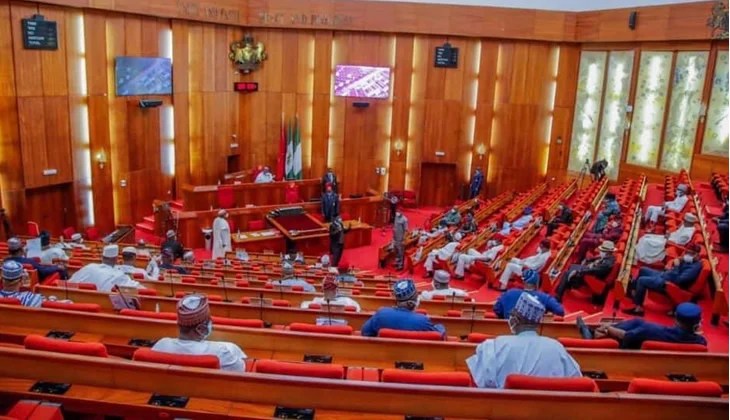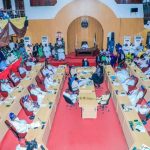The Senate’s move to create the National Council of Traditional Rulers of Nigeria has ignited a wave of nationwide outrage over a contentious provision that elevates the Ooni of Ife and the Sultan of Sokoto above all other traditional rulers in the country.
While the monarch bill—sponsored by Senator Simon Bako Lalong (Plateau South)—ostensibly seeks to give constitutional recognition to the role of traditional rulers, a specific clause assigning permanent co-chairmanship of the proposed council to the Ooni and the Sultan has drawn sharp criticism from prominent socio-cultural groups, civil society organisations and individuals across Nigeria’s diverse regions.
The bill, which passed second reading in March, is currently under consideration by the Senate Committee on Establishment and Public Service. However, its perceived disregard for Nigeria’s pluralistic heritage has been described as divisive, undemocratic, and a threat to the federal character principle enshrined in the Constitution.
The apex Igbo socio-cultural organisation, Ohanaeze Ndigbo, has rejected the bill in its entirety. According to its National Publicity Secretary, Dr Ezechi Chukwu, the proposal is “ethnocentric and unjust,” warning that it undermines inclusiveness and national cohesion.
“We are astounded by the rationale behind such an asymmetric bill with utter disregard for fairness, equity, justice and the principle of federal character. The Senate has failed as the custodian of Nigeria’s democratic mandate,” Chukwu said.
The organisation described the bill as “reprehensible, discriminatory and distasteful,” and demanded its immediate withdrawal to preserve national unity.
Similarly, the Middle Belt Forum (MBF) expressed vehement opposition to the clause that grants the Sultan of Sokoto a permanent leadership role. The MBF contended that such elevation is historically inaccurate and culturally offensive.
According to Luka Binniyat, the Forum’s spokesperson, many monarchs in the Middle Belt—such as the Attah of Igala, the Tor Tiv, and the Etsu Nupe—possess deeper historical roots and cultural legitimacy than the relatively young Sokoto Caliphate.
“Historically, the Sokoto Caliphate is junior to ancient kingdoms like the Kwararafa Confederacy and the Igala Kingdom. The Sultan’s elevation would distort historical facts and denigrate indigenous dignity,” the statement read.
The MBF also pointed to the Sultan’s primary identity as a religious leader rather than a secular traditional ruler, warning that his elevation risks alienating non-Muslim communities and violating the secular principles of the Nigerian Constitution.
The Forum warned that if the Senate insists on passing the bill with the controversial clause, it will mobilise traditional rulers across the Middle Belt to boycott the council and form their own autonomous traditional council that reflects the region’s cultural values and identity.
In a surprising turn, a group of Concerned Hausa Stakeholders also rejected the bill, stating that the Sultan of Sokoto, as the spiritual leader of Muslims, cannot claim to represent the Hausa cultural identity.
“The Sultan is the Sarkin Musulmi, not a traditional ruler in the ethnic sense. His legitimacy is religious and Fulani-specific, not cultural or pan-northern,” the group said in a strongly-worded statement.
They further argued that if spiritual leadership is a criterion, then Christian leaders, such as the President of the Christian Association of Nigeria (CAN), should be granted equal status—emphasising that Nigeria is a multi-faith, multi-ethnic nation.
The group also highlighted the exclusion of other historically grounded monarchies such as the Shehu of Borno, Obi of Onitsha, and the Oba of Benin, warning that the bill promotes ethnic hierarchy and marginalisation.
Voices of dissent have also emerged from the South-West, with notable Yoruba figures questioning the elevation of the Ooni of Ife.
Dr Femi Adebowale, a university lecturer, described the clause as “insulting and historically inaccurate,” asserting that the Alaafin of Oyo historically holds a more revered position within the Yoruba hierarchy.
“The Ooni of Ife cannot speak for the Yoruba nation. He can only speak for his domain in Osun. To place him above the Alafin, the Alake, and others is unacceptable,” he said.
Caleb Osazuwa, a Lagos-based lawyer from Benin, Edo State, described the move as the “greatest joke of the century,” questioning whether the revered Oba of Benin would be expected to defer to the Ooni.
“If this council is to gain legitimacy, every major ethnic group must be equally represented. Anything less is a recipe for chaos and disunity,” he noted.
The Alaigbo Development Foundation (ADF) has also condemned the proposal, describing it as “an insult to Nigeria’s cultural diversity” and a blatant provocation.
“This bill is not only provocative but also subjugative. President Bola Tinubu should know there is a limit to provocation. A million Tinubus cannot subjugate Ndigbos,” the group warned.
While the proponents of the bill argue that the council would unify traditional institutions and promote cultural diplomacy, critics insist that the current structure of the proposal is antithetical to the values of equity and inclusion.
From the Igbo and Middle Belt to the Hausa, Yoruba and Benin, there is a clear consensus: Nigeria’s traditional leadership cannot be governed by a model that privileges a select few to the detriment of others.
Stakeholders have unanimously called for a rotational or elective chairmanship model for the council—one that reflects Nigeria’s diversity and ensures equitable representation across ethnic and religious lines.
Whether the Senate will amend the bill in light of these concerns or proceed with its current form remains to be seen. What is clear, however, is that any attempt to institutionalise hierarchy among Nigeria’s traditional rulers risks reopening historical wounds and deepening national divides.








